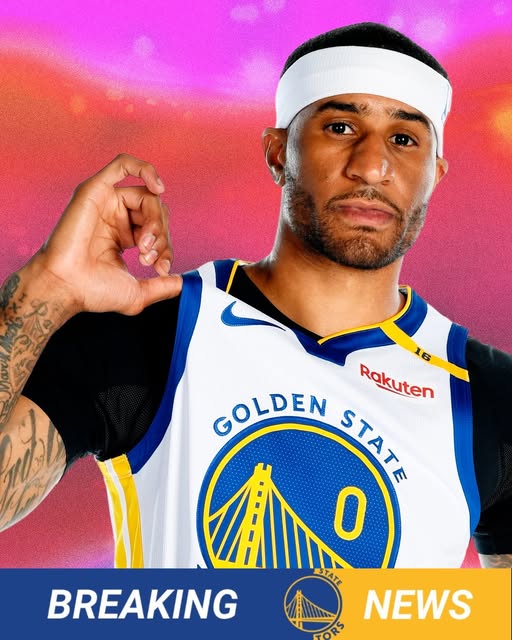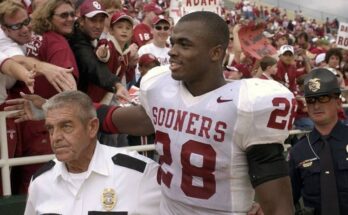BREAKING: Golden State Warriors Prioritize Offensive Firepower as Gary Payton II Departs, Signaling a New Era in Roster Philosophy
In a move that signals a definitive shift in team-building philosophy, the Golden State Warriors have chosen to prioritize offensive versatility over defensive specialization as veteran guard Gary Payton II departs the franchise. Payton’s exit marks not just the end of a chapter for one of the league’s most tenacious perimeter defenders, but a deeper recalibration of the Warriors’ organizational identity—one that has long been defined by the balance between high-octane offense and elite defense. With Payton moving on, the Warriors are embracing a new era, one that will rely more on offensive dynamism than the gritty, lockdown principles that helped define their championship runs.
Gary Payton II was never the star of the show, but his contributions were vital. He provided something few guards in the league could consistently deliver: point-of-attack defense that disrupted elite scorers, transition hustle plays that shifted momentum, and a deep understanding of his role within the Warriors’ intricate system. Though his offensive numbers were modest, his impact often transcended the box score. Payton was the type of player who could tilt a playoff game with a timely steal, a chasedown block, or a deflection that sparked a fast break. He was the glue guy, the spark plug, the perimeter wall who could match up against point guards, wings, and even switch onto bigger players in critical moments.
But as the Warriors look ahead to the 2025–26 season, the front office has made it clear that the priority is changing. After two straight seasons of offensive inconsistency, a lack of floor spacing, and overreliance on Stephen Curry’s brilliance, Golden State is actively reshaping the roster around skill, shooting, and offensive creativity. The exit of Payton is one of the clearest signs yet that the franchise is moving away from the defensive-first ethos that helped secure multiple championships and pivoting toward maximizing scoring potential and lineup versatility.
The decision didn’t happen in a vacuum. The Western Conference has evolved, with teams like the Denver Nuggets, Oklahoma City Thunder, and Minnesota Timberwolves emphasizing offensive firepower and positional size. The Warriors, once trendsetters, have spent the past two seasons trying to keep pace while staying true to their core identity. The results were mixed: flashes of brilliance offset by stretches of stagnation, and defensive focus that at times couldn’t mask their inability to score consistently without Curry on the floor. As a result, team president Mike Dunleavy Jr. and head coach Steve Kerr entered this offseason with a clear mandate—elevate the team’s offensive ceiling and surround Curry with players who can generate their own offense, shoot from deep, and play at a faster tempo.
This shift in vision made Payton, for all his defensive excellence, a luxury the Warriors could no longer afford. Injuries also factored into the decision. Since his return to Golden State after a brief stint in Portland, Payton struggled to stay healthy. His availability in key stretches of the past two seasons was limited, and while his on-court presence still made a difference when he was able to play, the inability to consistently count on his body began to limit his role. Younger, more durable wings are now being targeted by the front office—players who can play both ends of the floor without compromising spacing or fluidity.
Golden State’s focus on offense is also evident in recent acquisitions and rotations. The team has added players who bring shooting, ball-handling, and positional flexibility, including the development of Jonathan Kuminga and Moses Moody into more assertive offensive weapons. Kuminga, in particular, is expected to take a leap in both usage and scoring responsibilities, while the Warriors have also reportedly explored external options to add another high-level scoring guard or wing. Payton, who thrived as a defensive specialist and low-usage role player, simply didn’t fit that new mold.
There’s also a financial element to the decision. Under the NBA’s new collective bargaining agreement, teams operating deep into the luxury tax are facing increasingly punitive penalties. For a player like Payton, whose role is narrowly defined and whose availability has been inconsistent, the cost-benefit analysis began to shift. The Warriors, who have multiple large contracts on the books, including those for Curry, Green, and potentially Klay Thompson if re-signed, must now make hard decisions about how to allocate mid-level money and bench minutes. The front office appears to be betting that a younger, more offensive-minded rotation will give them a better chance to compete in the evolving Western Conference landscape.
From a locker room standpoint, Payton’s presence will be missed. Teammates frequently praised his work ethic, defensive instincts, and selfless approach to the game. He brought a toughness that was infectious and a mindset that aligned perfectly with Golden State’s championship culture. Coaches often cited him as a player who knew how to win possessions—whether it was diving for a loose ball, taking a charge, or forcing a turnover. But even the most beloved players sometimes fall victim to the harsh realities of roster construction and long-term planning. As much as the team respected Payton, the broader vision has shifted.
Steve Kerr has often said that the Warriors’ identity is built around defense, but even he acknowledged late last season that the team needs more scoring options. Curry, who continues to play at a near-MVP level, has carried a disproportionate load. When opposing defenses trap him, or when he sits, Golden State’s offense often grinds to a halt. The team has tried using Draymond Green as a playmaker and trusted young players like Brandin Podziemski to initiate offense, but those solutions have not been consistent enough to elevate the bench. With the loss of Jordan Poole last season, and now the loss of Payton, the Warriors are clearly moving toward a new rotation—one where spacing, shooting, and versatility matter more than ever.
What does this mean for the Warriors moving forward? It means lineups that prioritize five-out spacing, with multiple shooters on the floor. It means a faster pace and more aggressive offensive schemes built around Curry’s gravity. It means more touches for Kuminga, more minutes for offensive-minded wings, and possibly more ball-handling duties shared across the roster. It also likely means more pressure on the team’s remaining defenders to make up for the absence of a perimeter stopper like Payton. Draymond Green, Andrew Wiggins, and even Moody will be asked to guard tougher assignments, while the coaching staff develops new schemes to account for the absence of Payton’s defensive playmaking.
From Payton’s perspective, the move opens a new chapter. Though his destination is yet to be officially confirmed, several teams have expressed interest in adding his veteran presence and defensive mindset to their rotation. He remains one of the few guards in the league capable of altering matchups on the defensive end, and in the right system—particularly one with strong offensive personnel—his value could be quickly restored. Wherever he lands, Payton’s next team will be getting a player who still has the ability to turn the tide of a playoff series with his relentless energy and elite anticipation.
As for the Warriors, this moment represents a turning point. The departure of Payton is about more than just one player leaving. It’s about identity. It’s about strategy. It’s about change. For a franchise that has always prided itself on balancing the flash of Curry’s brilliance with the grit of defensive execution, the departure of a defensive lynchpin like Payton symbolizes the passing of an era. The Warriors are no longer just the team that stifled opponents while dazzling them with ball movement and three-point barrages—they are now actively reshaping themselves to meet the modern NBA’s emphasis on pace, space, and scoring.
Only time will tell if this shift yields another championship or another early exit. But one thing is clear: the Golden State Warriors are going all-in on offense. And with that decision comes both opportunity and risk. As Gary Payton II exits, he leaves behind a legacy of hustle, sacrifice, and defensive brilliance. The Warriors now turn the page, chasing their next title with a new formula—and without one of their most trusted defenders.



